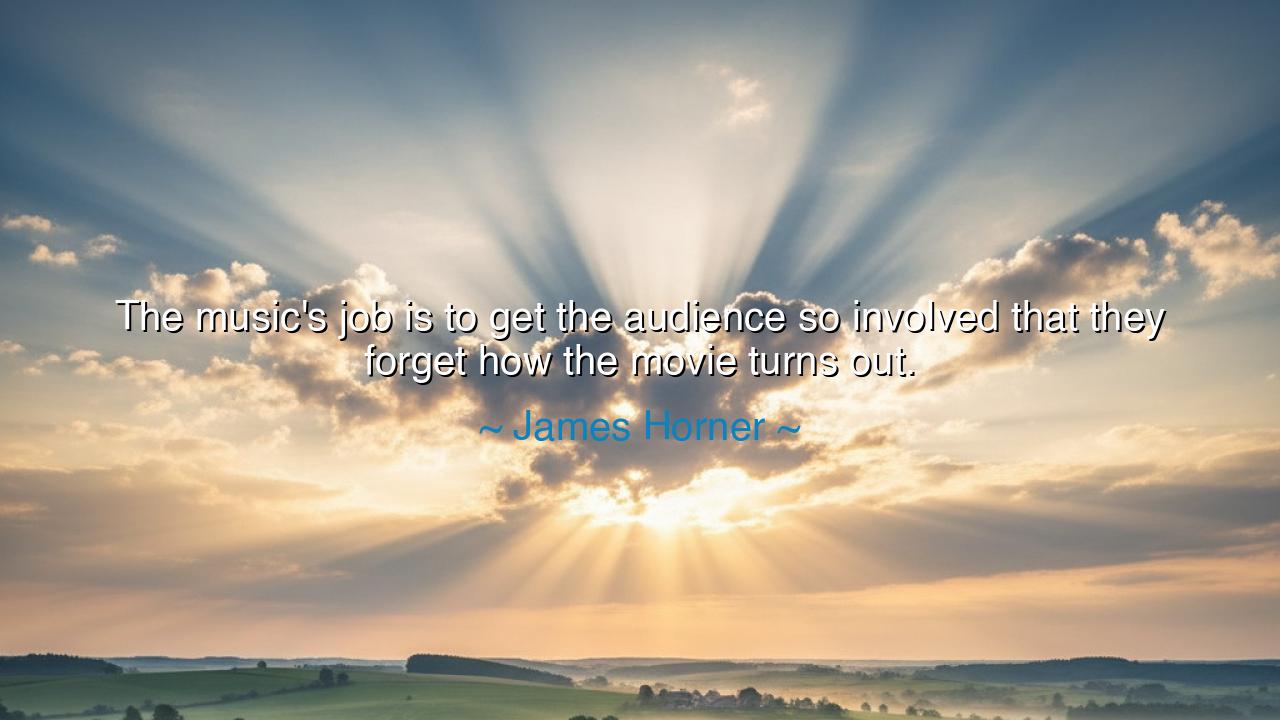
The music's job is to get the audience so involved that they
The music's job is to get the audience so involved that they forget how the movie turns out.






The master of sound and emotion, James Horner, whose scores carried worlds upon their notes, once declared: “The music’s job is to get the audience so involved that they forget how the movie turns out.” These words are not only the wisdom of a composer, but the revelation of an ancient truth—that art’s highest calling is not to inform, but to transform, not to tell us what happens, but to immerse us so deeply that we live it as though it were our own.
When Horner speaks of music’s job, he reveals the hidden heart of cinema. A film may have actors, images, and stories, yet without music, it is a body without a soul. Music does not explain—it enfolds. It stirs the audience beyond thought, into feeling. It is the invisible river flowing beneath the surface of the story, carrying hearts so fully that they forget the destination. For when music is true, the ending no longer matters, because the journey itself becomes sacred.
To say that music makes us forget how the movie turns out is to speak of immersion. We may know that the ship will sink in Titanic, yet when Horner’s score rises with voices like angels, we weep as though we did not know. We may know the hero will triumph, yet the swelling of violins makes us tremble, uncertain, as though fate itself still hangs in the balance. Such is the magic of music: it suspends us in the eternal present, where the heart knows only now, only this breath, only this emotion.
History, too, bears witness. The ancient Greeks, in their tragedies, used the chorus not only to narrate but to sing, to bind the audience’s heart to the drama unfolding. Even when the tale was known—when all were certain Oedipus would fall—the music and chant made each moment feel fresh, raw, and immediate. So it has always been: music is the force that keeps memory at bay and awakens presence in its place.
Horner himself lived this truth. In Braveheart, the fate of William Wallace was known to history, yet when the pipes and drums cried out, the audience was swept into his struggle, heart beating as if the outcome could change. In Apollo 13, history had already written the ending, but Horner’s music made us forget certainty, holding us in the suspense of the moment, reminding us that art is not about what happens, but how it feels to live it.
The wisdom here is mighty: music carries us beyond knowledge into experience. Life itself often tempts us to live in endings—thinking of where things will go, how they will finish. But music, like life at its fullest, teaches us to inhabit the moment so deeply that the end does not matter. The song of the present is richer than any memory or expectation.
The lesson, then, is clear. Let your own life be lived like Horner’s music—not in rushing to the conclusion, but in embracing each step as if it were eternal. Do not live only for the ending, for it will come soon enough. Live so fully in the now that you forget the outcome, and find yourself completely immersed in the journey. Surround yourself with music that awakens presence, and let it guide you into living with heart, not merely with thought.
So remember Horner’s words: the true power of music is to make us forget the end and fall in love with the moment. This is not only the task of composers, but the task of every soul: to live so richly, to create so deeply, that life itself becomes a song—one whose beauty is not in its ending, but in every note along the way.






AAdministratorAdministrator
Welcome, honored guests. Please leave a comment, we will respond soon